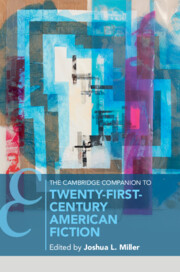Book contents
- The Cambridge Companion to Twenty-First-Century American Fiction
- The Cambridge Companion to Twenty-First-Century American Fiction
- Copyright page
- Contents
- Illustrations
- Contributors
- Acknowledgments
- Chronology
- Introduction
- Part I Forms
- 1 Short Fiction, Flash Fiction, Microfiction
- 2 Experimental Fiction
- 3 Speculative Fiction
- 4 Graphic Fiction
- 5 Digital Fiction
- Part II Approaches
- Part III Themes
- Further Reading
- Index
3 - Speculative Fiction
from Part I - Forms
Published online by Cambridge University Press: 02 September 2021
- The Cambridge Companion to Twenty-First-Century American Fiction
- The Cambridge Companion to Twenty-First-Century American Fiction
- Copyright page
- Contents
- Illustrations
- Contributors
- Acknowledgments
- Chronology
- Introduction
- Part I Forms
- 1 Short Fiction, Flash Fiction, Microfiction
- 2 Experimental Fiction
- 3 Speculative Fiction
- 4 Graphic Fiction
- 5 Digital Fiction
- Part II Approaches
- Part III Themes
- Further Reading
- Index
Summary
Mark Bould’s chapter on “Speculative Fiction” begins with Jonathan Lethem’s literary critical counterfactual in which the genre border between science fiction and mainstream literature never existed and all novels about science were considered one group. As Bould points out, the very term slipstream itself was coined by Bruce Sterling to refer to the disconcerting works of science fiction that played across the edges of varied genre definitions. Heady mixtures of literary conventions have informed all regions of fiction since then, as speculative fiction draws on and critiques archaic and futurist literary movements representing empire, environmentalism, disability, illness, violence, as well as racial, gendered and sexual alterities.
Keywords
- Type
- Chapter
- Information
- Publisher: Cambridge University PressPrint publication year: 2021

